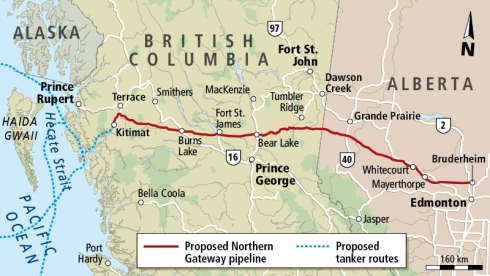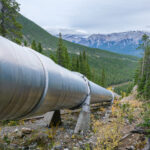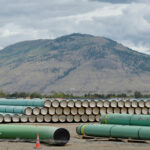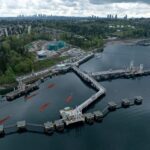On June 17, the Canadian federal government approved the pipeline portion of Enbridge Incorporated’s (ticker: ENB) Northern Gateway Project, a $6.1 billion crude oil and condensate pipeline and marine terminal that was proposed in 2010.
Canada’s petroleum producers are eager to find an alternative to the nearly six-year delayed approval of the Keystone XL project. At the Canadian American Business’ conference on June 17, Rob Merrifield, conservative member of the House of Commons said, “We feel victimized by U.S. regulations.”
The 731-mile Northern Gateway twin pipelines would move about 525 MBOPD from Alberta, Canada, across Canada’s Rocky and Coast mountains, to the port of Kitimat, British Columbia. Asia would be a primary target market for Canada’s oil upon completion of the Northern Gateway project. The Kitimat LNG project is the only one of its kind in Canada but construction has yet to begin.
 “Crude producers such as Canadian Natural Resources Ltd. (ticker: CNQ) and Cenovus Energy Inc. (ticker: CVE), facing a five-year average discount of almost $20 a barrel for their oil relative to U.S. benchmarks, are seeking new markets,” Bloomberg News reported.
“Crude producers such as Canadian Natural Resources Ltd. (ticker: CNQ) and Cenovus Energy Inc. (ticker: CVE), facing a five-year average discount of almost $20 a barrel for their oil relative to U.S. benchmarks, are seeking new markets,” Bloomberg News reported.
Canada is the world’s fifth largest energy producer and is the principal source of U.S. energy imports. Canada’s unconventional oil sands are a significant contributor to the recent and expected growth in the world’s liquid fuel supply and comprise the vast majority of the country’s proven oil reserves, which rank third globally, according to the EIA.
The Canadian Association of Petroleum Producers reported that Canadian oil-sands output is set to more than double to 4.1 MMBOPD by 2025 from 2013’s levels.
However, the Gateway project is far from shovel ready. There are 209 conditions, created by a regulatory review panel in December, and five additional conditions set by British Columbia Premier Christy Clark, that Enbridge must meet. Natural Resources Minister Greg Rickford said, “The proponent clearly has more work to do in order to fulfill the public commitment it has made to engage with Aboriginal groups and local communities along the route.”
ENB does not have a timeline for when the new estimates based on the conditions will be made public, but Bloomberg News said, it “must have liability coverage of C$950 million and lead research efforts on heavy-oil spills in marine and freshwater environments. Other conditions include building extra oil storage facilities at Kitimat and establishing an emergency-response plan with the ability to handle a spill of about 230,000 barrels, more than three times the legal requirement.”
Although several of the conditions address environmental protection and aboriginal financial benefits, aboriginals and environmentalists are working to delay, if not end, the project. Tom Mulcair, the leader of the New Democratic party, called the pipeline “a severe threat to social order, social peace.” Aboriginals like the Yinka Dene Alliancefear that oil spills would destroy their fisheries and shellfish beds.
A Bloomberg-Nanos poll from June 3 reported that 34% of residents said they want the pipeline blocked, 33% want it delayed for further review, and 29% wanted Northern Gateway approved. The potential of a pipeline spill worried 36% of residents, who claimed the event, though unlikely best represented their anti-pipeline stance. Other residents said job creation and the contributions to climate change best represented their view, with the two categories garnering 25% and 15% of their vote, respectively.
The ENB’s website says, “We’re committed to building a pipeline that will be a model of world-class safety and environmental standards.” Janet Holder, Enbridge’s Executive Vice President of Western Access, said, “The regulatory process for Northern Gateway has been the most rigorous and thorough of its kind in Canadian history. From the very beginning, that’s been our goal – to build a safer, better pipeline.”
The website also said that they have been in constant contact with communities in the pipeline areas, which has led to “more than 20 revisions – including hundreds of individual changes – to the Northern Gateway pipeline route to minimize impact and enhance safety.”
Other roadblocks to Canada’s efforts to export its oil come from Maine. South Portland, Maine is the second-largest oil port on the Atlantic coast, but the city has put a moratorium on Canada’s oil sands. South Portland residents and environmentalists fear the effects of an oil spill, arguing that oil sands are harder to transport and more difficult to clean up in the event of a spill. According to the Portland Press Herald, people are also concerned that loading crude oil onto ships could have a “negative visual impact on the waterfront.” Petro Global News reported that “The Portland-Montreal Pipeline runs through South Portland. Currently the pipeline transports crude from Portland to Canada. The ordinance is intended to prevent the reversal of the pipeline’s flow that would bring Alberta oil sands into Portland.”
[sam_ad id=”32″ codes=”true”]
Important disclosures: The information provided herein is believed to be reliable; however, EnerCom, Inc. makes no representation or warranty as to its completeness or accuracy. EnerCom’s conclusions are based upon information gathered from sources deemed to be reliable. This note is not intended as an offer or solicitation for the purchase or sale of any security or financial instrument of any company mentioned in this note. This note was prepared for general circulation and does not provide investment recommendations specific to individual investors. All readers of the note must make their own investment decisions based upon their specific investment objectives and financial situation utilizing their own financial advisors as they deem necessary. Investors should consider a company’s entire financial and operational structure in making any investment decisions. Past performance of any company discussed in this note should not be taken as an indication or guarantee of future results. EnerCom is a multi-disciplined management consulting services firm that regularly intends to seek business, or currently may be undertaking business, with companies covered on Oil & Gas 360®, and thereby seeks to receive compensation from these companies for its services. In addition, EnerCom, or its principals or employees, may have an economic interest in any of these companies. As a result, readers of EnerCom’s Oil & Gas 360® should be aware that the firm may have a conflict of interest that could affect the objectivity of this note. The company or companies covered in this note did not review the note prior to publication. EnerCom, or its principals or employees, may have an economic interest in any of the companies covered in this report or on Oil & Gas 360®. As a result, readers of EnerCom’s reports or Oil & Gas 360® should be aware that the firm may have a conflict of interest that could affect the objectivity of this report.







